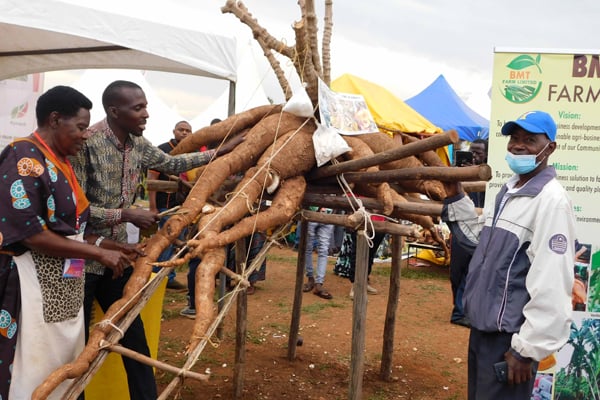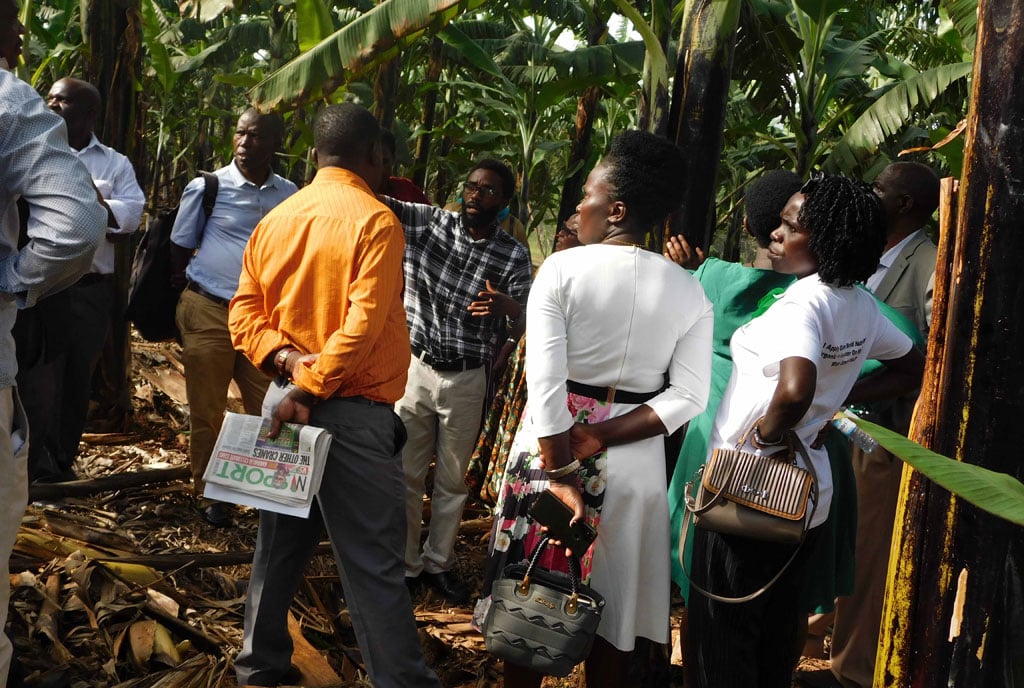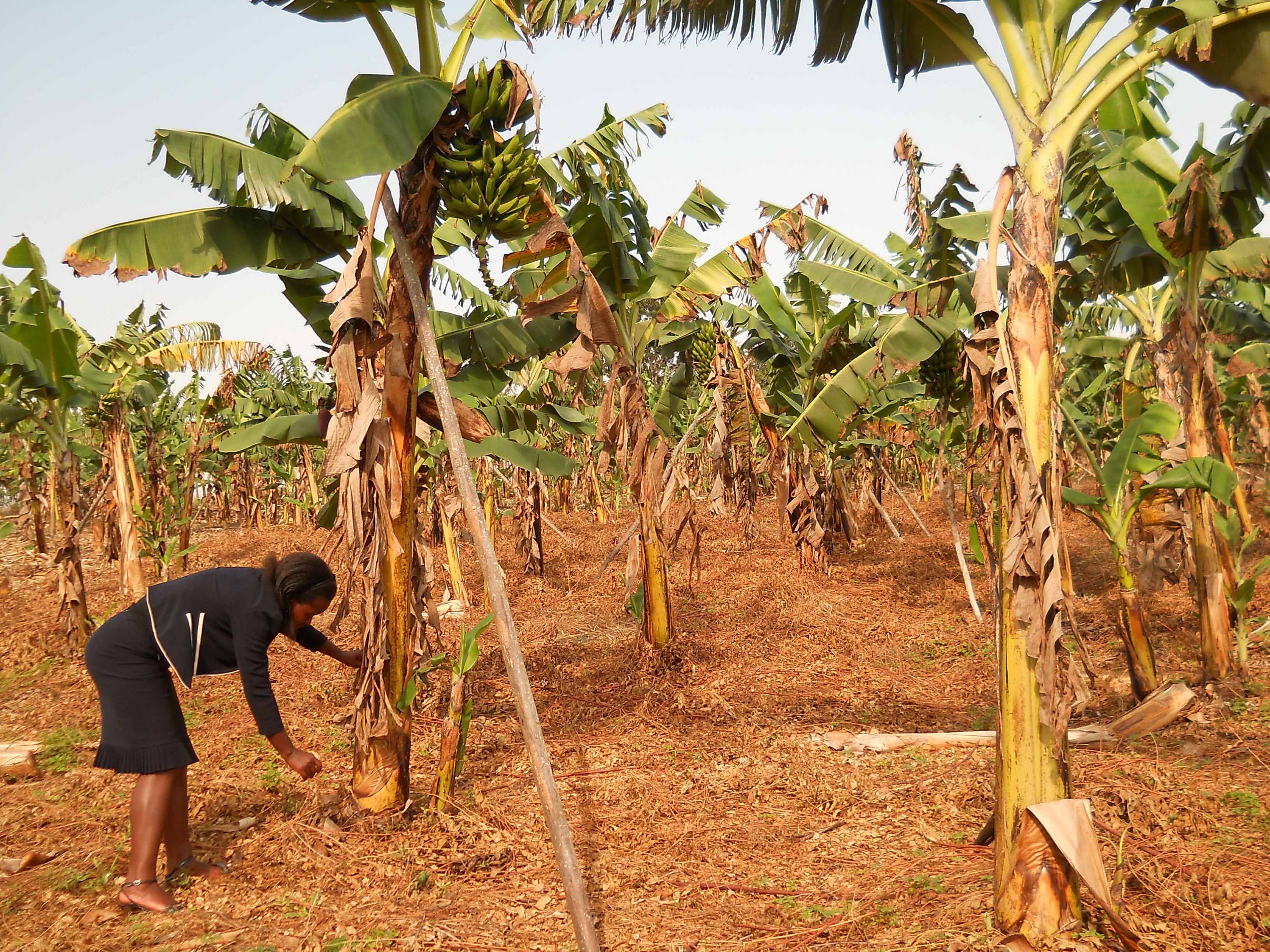Farmers pick more at PEWOSA

Speranza Kenyana and son Jude Kato from Isingiro display large cassava tubers at CBS POWESA agribusiness fair 2022 . Photo/Michael J ssali.
What you need to know:
- Agricultural experts trained farmers in good farming practices. It was an opportunity for the farmers to learn about the importance of using high yielding coffee seedlings, coffee value addition, animal husbandry, natural environment protection, tissue culture seedlings for banana and pineapple.
Thousands of farmers and school children from the central region visited the CBS PEWOSA agri business fair 2022 which took place in Masaka City from October 20 to 24.
CBS PEWOSA agribusiness fair 2022 is the brain child of PEWOSA Project which was formed by Buganda Kingdom’s CBS FM radio some 10 years ago.
Eveline Nakiryowa a sales and marketing official said: “In the beginning it was for women but later the men also came on board. So, in a way, the Agribusiness Fair 2022 is going to be an annual celebration for POWESA at which the members will be meeting and sharing stories.”
To be held annually
“The aim for holding the fair is to emphasize our message to the farmers that farming must never be looked upon as a punishment but rather as a decent occupation and a respectable means of earning a living,” Nakiryowa told Seeds of Gold at the beginning of the show. “We want to take farming to a higher level from mere subsistence to profitable business enterprises for the farmers. We particularly want to emphasize coffee growing and to add value to the crop. They must take the three Gs of coffee seriously which in our language stand for: Gilime (grow it) Ginnywe (drink it) Gifunemu (get money out of it),” she added.
Technology in farming
She further disclosed that the agribusiness fair is also intended to demonstrate that farming is not an activity to be carried out only during the rainy season but rather throughout the year because irrigation equipment was available at the fair for everybody to see and to learn about how the machines work and how much they cost.
“The fair also exposed to the farmers money lending institutions such as banks, insurance companies, and Saccos which have set up stalls and to which farmers can go for advice and guidance regarding credit. They are going to learn how to carry out commercial farming on small plots of land. They will see various value addition products made by fellow farmers out of the crops that they grow, such as wine from fruits such as passion fruit, pineapple, and bananas. They will have face-to-face encounters with various agro-input-dealers and farmers demonstrating the best farming practices of different crops ranging from food crops, cash crops, trees, fodder grass, and medicinal plants,” says Nakiryowa.
Training sessions
There were some reserved tents where agricultural experts trained farmers in good farming practices. It was an opportunity for the farmers to learn about the importance of using high yielding coffee seedlings, coffee value addition, animal husbandry, natural environment protection, tissue culture seedlings for banana and pineapple and how young people can participate in profitable farming including those with small plots of land. At one section of the show under tents labelled “PEWOSA Coffee” special emphasis was laid on teaching farmers about coffee best farming practices on the first day of the show (October 21).
Lessons learnt
On the second day the emphasis was to teach farmers how to prepare coffee for drinking --- harvesting only ripe coffee cherries, removing the husks, drying the coffee beans, roasting the dried beans and crushing them into coffee powder for drinking. The third day was what was referred to as Ekibbiitu kya Kaawa (Coffee Drinking Festival). On the fourth day, all show goers assembled under the tents labelled POWESA Coffee to witness Katikkiro Charles Peter Mayiga, flag off the coffee drinking campaign.
Masaka Cooperative Union (MCU) had a stall at which were displayed: coffee seedlings, coffee beans, packets of powder coffee, among other products. Uganda Coffee Development Authority (UCDA) had a stall at which stall attendants taught farming practices such as the benefits of coffee tree stumping and how to stump the trees.
Many other farmer groups such as Kibinge Coffee Farmers Cooperative Society had stalls at the fair where show goers were served with coffee to drink, apart from demonstrating recommended coffee seedlings, their powder coffee packs and other products.
Agro machinery
Car and General displayed KUBOTA tractors and ploughs, and a tipping trailer. Their Product Development Manager, Mathias Asiimwe, was there to explain to the show goers the various attributes of the tractor such as fuel efficiency and reduced down time as well as the process of acquiring the tractor for buyers that do not have sufficient cash to purchase the tractor but are ready to pay in instalments. “The farmer can pay the cash that is available to us and we may link him to a bank which will pay the rest of the money and the farmer pays in instalments to the bank,” Asiimwe told Seeds of Gold.
At another stall, Masaka Integrated Bee products Association (MIPA) displayed various containers of honey, beehives, and other products. Their information officer, Rwewundiza Paul, kept explaining to the goers the importance of bees in farming. He also spoke to them about the need of settling bees in their farms and the danger of mindless usage of herbicides which kills bees. Robert Munyoloaganze, a small-scale farmer in Kyanamukaaka Sub-county, Masaka District displayed different medicinal herbs grown at his farm and seedlings for straw berries and apples.




